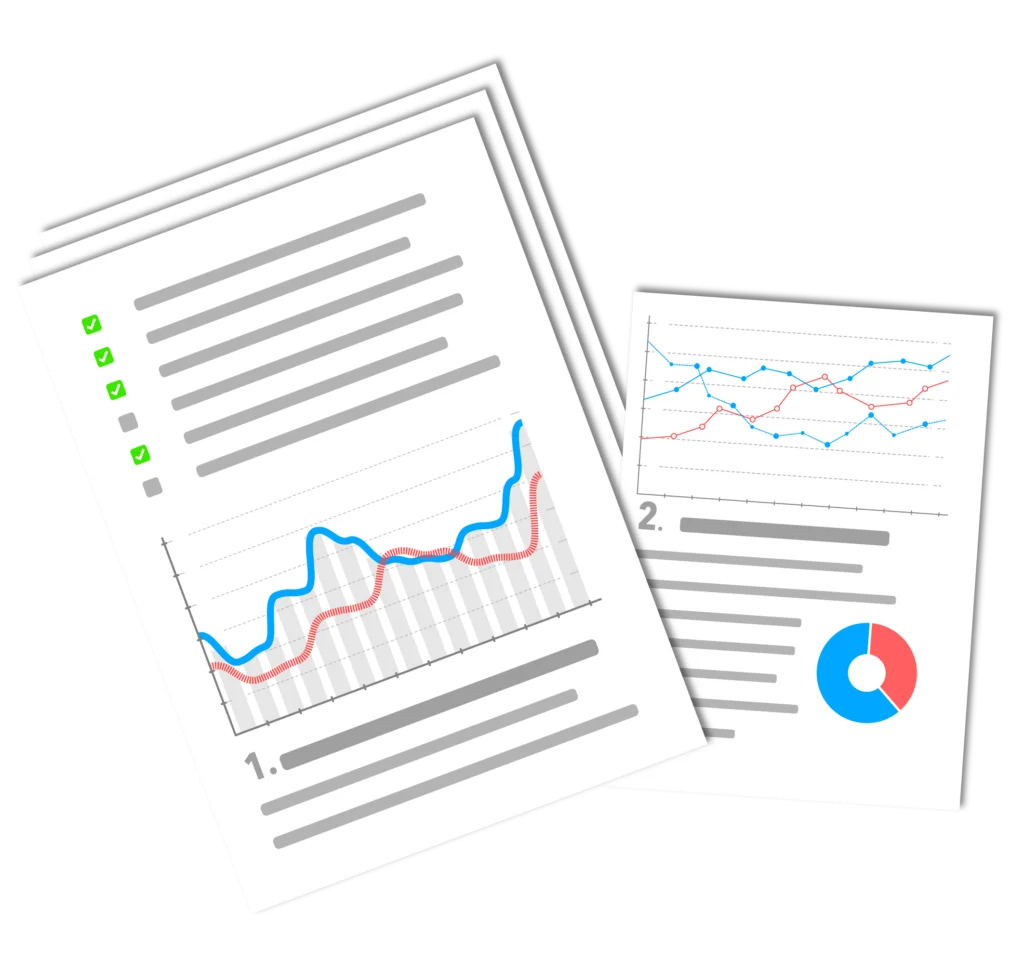Everyone wants to be at the top of Google. When your brand is at the top for a highly competitive search term, it's like an actor seeing his name in the spotlight on Broadway. And for many brands, the easiest way to get to the top of the algorithm is to Keyword-Ranking to monitor, a thorough Keyword-search and achieve a top position in the Google snippets.
Keywords are the heart of an SEO strategy. Without them, you're basically just throwing spaghetti at the wall. If you want to rise in the search results, it's important to track your results. With the right third-party tool, you can track your KeywordMonitor the performance and overall impact of your digital marketing strategy in an easy-to-use reporting tool.
Keywords take into account what people are searching for in real life and help you to ensure that your content is displayed when they use these search terms. Knowing the terms people are typing in to find your website is the first step to getting the SERP-functions and develop a successful SEO strategy that targets customers who are ready to buy.
But it's not all easy. Your Ranking for certain search terms can fluctuate dramatically, especially if you're in a highly competitive industry. That's why it's important to monitor your chosen keywords so that you can react immediately if your rankings drop and avoid these fluctuations.
How should I monitor keywords?
Here is a little guide that will certainly help you!
1. type of keywords:
First of all, you should know that there are different types of keywords:
- Short-Tail Keywords: These are often just one or two words. Example: "sports shoes".
- Long-tail keywords: These are more specific search queries that often include more words. Example: "red sports shoes for women".
- Transactional Keywords: These are purchase-oriented. Example: "Buy sports shoes".
- Informational Keywords: These are used to obtain information. Example: "best sports shoes for marathons".
Illustration: Think of keywords as tools in a toolbox. Some are big and heavy (short-tail), others are smaller and more specific (long-tail), and still others have a specific purpose (transactional, informational).
2. prioritization:
- Business-relevant: Think about which keywords are most relevant for your business. Which ones best describe your offer?
- Search volume vs. competition: Keywords with high Search volume are great, but if the competition is too strong, it could be difficult to land on the first page. Long-tail keywords are often an insider tip here, as they are less searched for, but are often less competitive and have a higher conversion rate.
Illustration: Imagine you are at a market. Some stalls (Short-Tail Keywords) have huge queues (competition), but next to them there are smaller stands (long-tail keywords) with fewer people. There you could be served faster and find exactly what you are looking for.
3. frequency of monitoring:
- Weekly: For very important keywords, especially if you are carrying out active SEO measures to rank better.
- Monthly: For the majority of your keywords to monitor trends and changes.
- Quarterly: For a general overview and strategic planning.
Illustration: Think of your keywords like houseplants. Some need water every week (weekly monitoring), others get by with monthly watering (monthly monitoring). And then there are the cactuses that only need a check every now and then (quarterly).
Tools: Es gibt zahlreiche Tools, um Keywords zu überwachen. Einige der bekanntesten sind Google Search Console, SEMrush, Ahrefs and Ubersuggest.
Now that you know how to keep an eye on your keywords, it's time to get active. Good luck monitoring and optimizing your keywords! 🚀🔍
Why should I use keyword monitoring?
You probably don't need any more convincing, but if you do, this will help you Keyword Monitoring on the following things.
- You can track your rankings: With Keyword Monitoring you can track your rankings for specific keywords and see how your website compares to your competitors.
- You can discover new keywords: Keyword Monitoring can help you discover new keywords to include in your SEO strategy. This can help you get more Traffic from search engines.
- You can improve your SEO strategy: By tracking your rankings and discovering new keywords, you can adjust and improve your SEO strategy to get better results.
- You can track your brand: With Keyword Monitoring you can also track how your brand is mentioned on the internet. You can see how often your company or your products are mentioned in search engines and how this compares to your competitors.
What is keyword monitoring?
Keyword-Monitoring is exactly what it says on the label: it involves monitoring your target keywords and tracking the position of your website in the search results. In this way, you can identify opportunities for improvement in order to improve your ranking and thus the Traffic on your website.
In an ideal world, you would be in the top three results on the first page for every search term that is relevant to your brand. If you can do that, great! But that doesn't mean you'll stay there. The Keyword-Monitoring helps you keep track of your position and react quickly when your Ranking falls off.
It is an essential part of a Keyword-strategy and shows you which keywords have the most impact. Traffic to your site. Once you have selected your most desirable keywords, you can monitor their position or work on improving your rankings with them.
You can see how many clicks and impressions each Keyword how high your average CTR is, how the visibility of your brand is developing under each Keyword has changed over time. And make decisions based on your placement in the search results.
Keyword monitoring: How to monitor rankings with SEO tools
The first step in the Keyword-Ranking-Tracking consists of selecting the right terms and then Ranking-opportunities. The easiest way to do this is with an onlineKeyword-monitoring tool or rank tracking software - there are many analysis tools, each with its own advantages and disadvantages.
If you don't know where to start, take a look at the keywords your competitors are ranking for so you have a chance to compete with them.
How can I see which keywords my competitors are using in the SERPs?
Here are some of the best tools you can use.
1. ahrefs
The Keywords Explorer from Ahrefs is one of the most popular tools for Keyword Monitoring. With it, you can combine long-tail keywords into your main keyword, capture valuable ranking data, and improve the Search volume for each term.
You can also get an overview of the top keywords your main competitors are ranking for and their average position to find out if there is a chance for you to rank higher than them. You can also see which Backlinks your competitors have won.
2. SEMRush
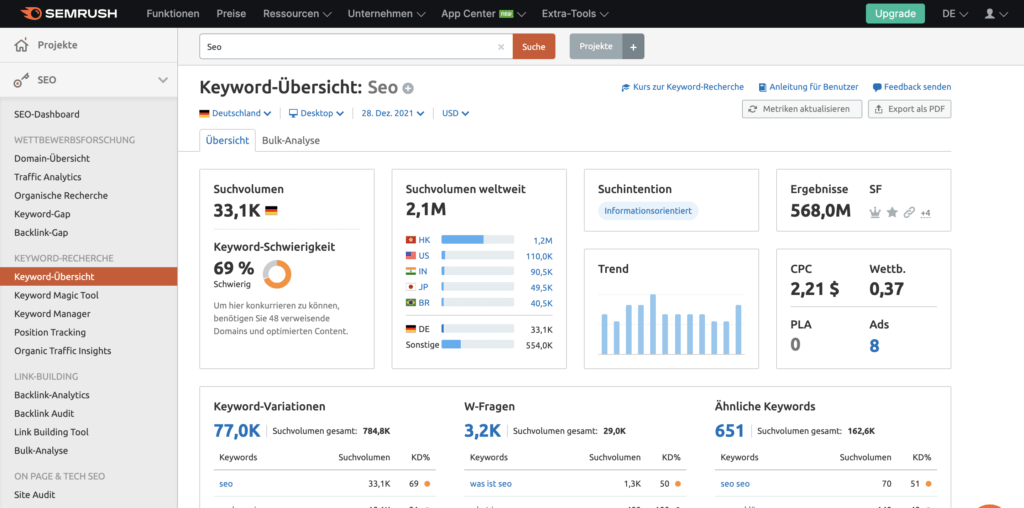
Like Ahrefs is also SEMRush a popular Keyword-research tool that allows you to quickly find out which keywords your competitors are creating content for and provides you with a list of new keywords.
You can use the Keyword-You can research your rank based on your competitors' URLs or simply track the keywords that your customers use most often.
3rd Accuranker
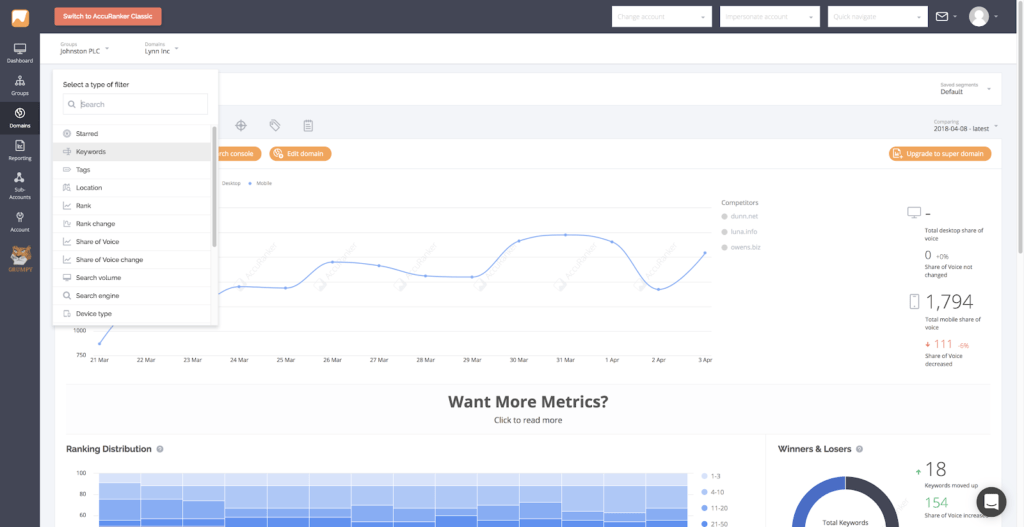
Accuranker provides you with daily real-time updates for an accurate Keyword Monitoring on Google and Bing. The tool allows you to track a range of keywords, your Ranking and recognize any ranking changes so that you can act quickly and increase organic search traffic.
4. oversuggest
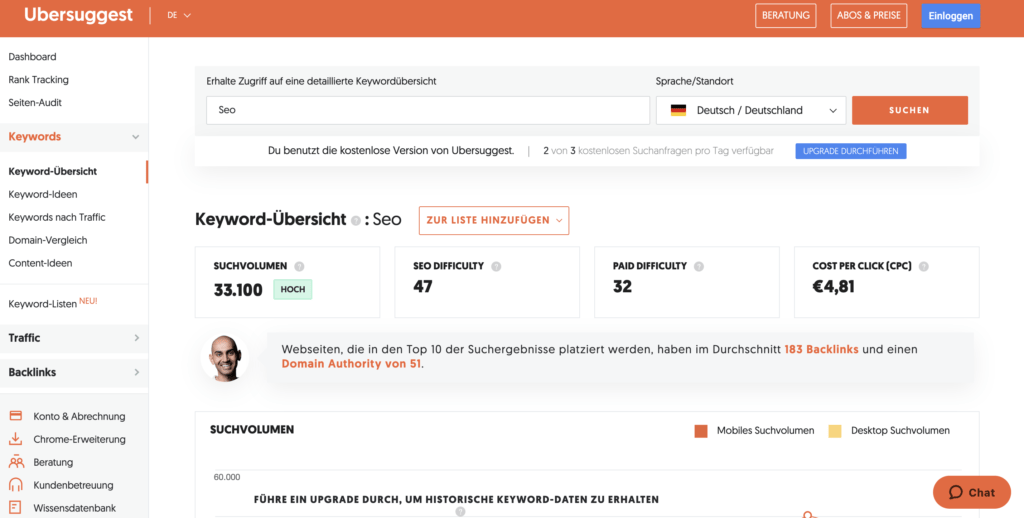
Ubersuggest is one of the best free tools for the Keyword Monitoring. With this you can not only Keyword-You can not only find out the volume and the best keywords your competitors are using, but also get ideas for content based on these keywords. This allows you to develop a comprehensive SEO strategy based on reliable data.
5 Google Search Console
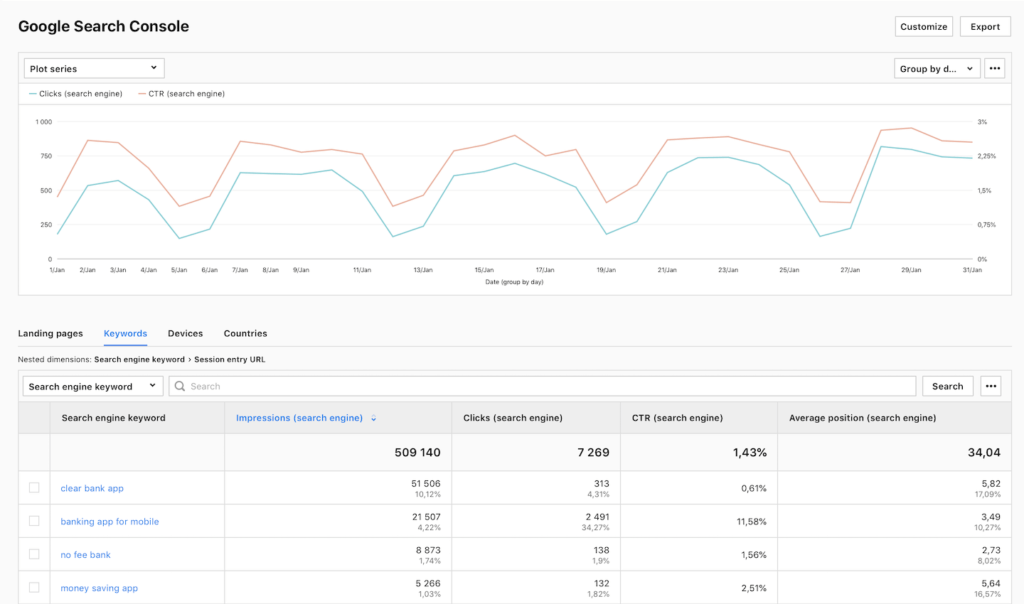
Google Search Console is the only Keyword Monitoring Tool that shows your exact traffic data and the exact number of clicks on your content in the search engines. Using detailed, performance-based web reports, you can see which keywords are the most successful and what the average click-through rate is based on these rankings.
The only disadvantage is that it does not show you current rankings, but only average rankings for the selected periods.
6. searchMetrics
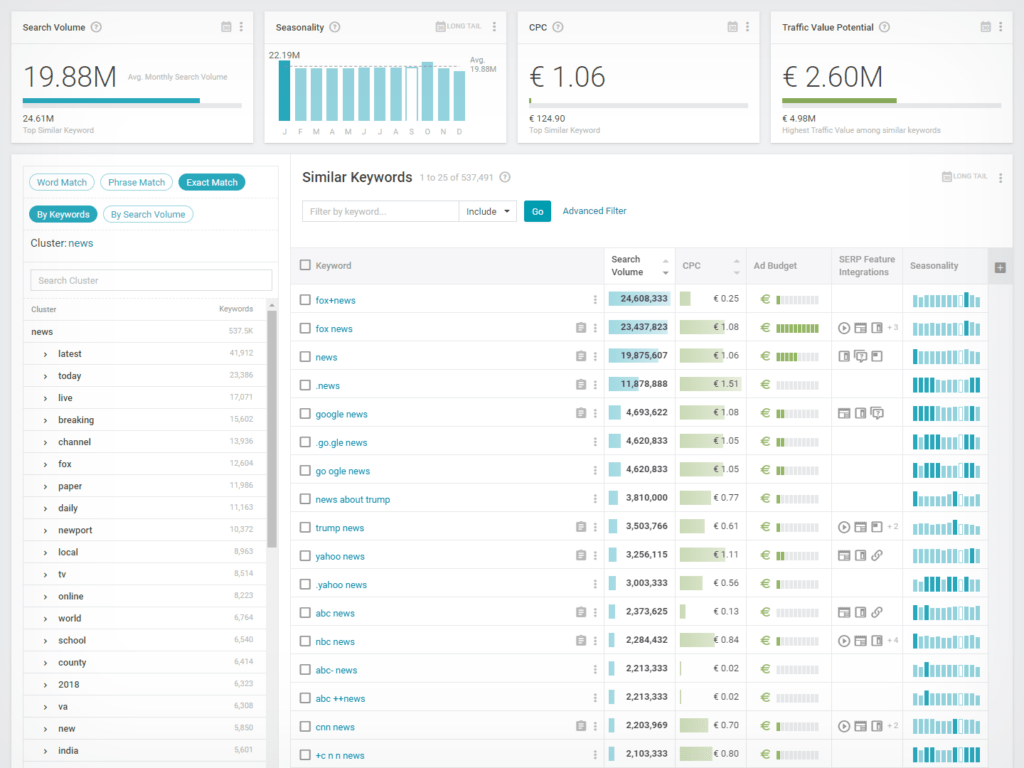
SearchMetrics provides a range of SEO and Content-marketing data and is a Ranking-tool that provides detailed insights into your best keywords and their average search engine rankings.
You can use it to gain insights into the competition, the Keyword-monitor rankings closely, evaluate links and compare target keywords on different domains.
7. tapping into trends
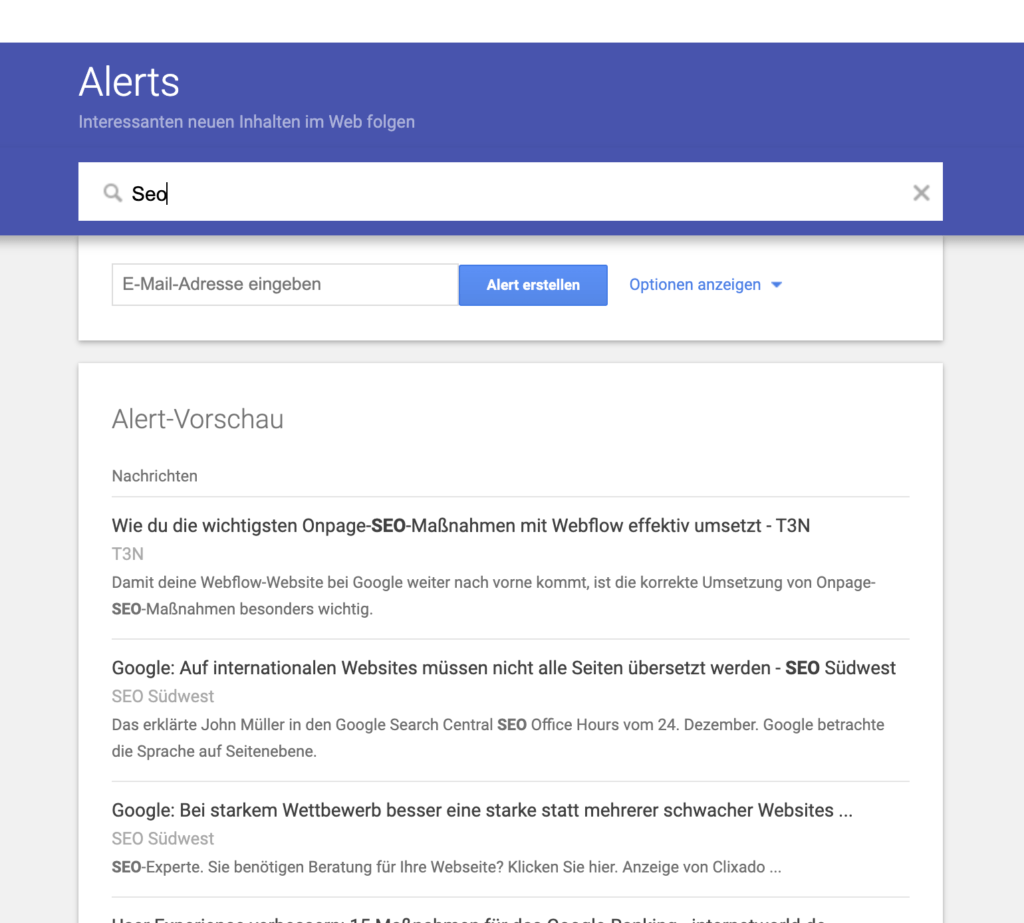
You don't just need a tracking tool. You can not only track your keywords with a special Keyword-research software, but also use data on general trends to improve your organic search rankings. Traffic to increase. This will tell you whether the popularity of your chosen keywords will rise or fall, depending on what is currently popular.
You can use keywords via Google Alerts to see how often new content is posted about them.
Advantages of Keyword Monitoring
- Monitoring your own website: You can Keyword Monitoring to see how well your own website ranks for certain keywords. For example, if you run an online store for shoes, you want to know how well your site ranks for "buy sports shoes".
- Competitive Analysis: Observe how well your competitors are performing for certain keywords. If you see that they rank better than you, this can be an impetus to revise your own SEO strategy. Example: You notice that a competitor ranks better than you for "vegan shoes" and decide to do more Content on this topic.
- Identification of new keywords: By monitoring keywords, you can discover new, relevant search terms that you should focus your SEO strategy on. Example: You find out that many people are searching for "ecological running shoes" and decide to include this term in your strategy.
- Tracking seasonal or trending keywords: Some keywords are seasonal or influenced by current trends. Example: You notice that people are increasingly searching for "waterproof boots" in winter and adjust your content accordingly.
- Detection of Ranking-changes: By continuously monitoring keywords, you can identify changes in the Ranking recognize and react early on. Example: You notice that your page for "sneakers" is suddenly ranking worse and get to the bottom of the cause.
- Content-Optimization: Find out which content on your website ranks best for certain keywords and optimize it if necessary. Example: You notice that your blog article on "tips for buying shoes" is ranking well and regularly update it with new information.
- Local SEO: Beobachte, wie gut deine Website für lokale Suchanfragen rankt, um gezielte lokale Marketingmaßnahmen durchzuführen. Beispiel: Du möchtest wissen, wie gut dein Schuhgeschäft in „Berlin“ abschneidet, um gegebenenfalls lokale Werbekampagnen zu starten.
- International SEO: If you're going global, you can do the Keyword Monitoring to see how well you rank in different countries and languages. Example: You also sell shoes in France and want to know how well you rank for "chaussures de sport".
- Measuring the success of SEO campaigns: Monitor the Keyword-rankings to measure the success of your SEO campaigns and make adjustments. Example: You have launched a campaign to rank better for "barefoot shoes" and are monitoring the results.
- Reputation Management: Monitor keywords that are related to your brand to identify potential negative Search results recognize at an early stage. Example: You want to know whether negative reviews are appearing for "XY brand shoes" and react accordingly to protect your brand image.
By regularly monitoring keywords in all of these use cases, you can adjust and optimize your SEO strategy in a targeted manner. This will help you to be more visible and successful in the highly competitive online market. Always remember: rankings and trends can change quickly, so stay tuned and continuously adapt your strategy to the current situation.
Keyword monitoring challenges
- Cost: Keyword-Monitoring can be costly, especially when companies use professional tools and services to monitor their keywords.
- Monitoring of too many keywords: It can be difficult to monitor the right number of keywords, as monitoring too many keywords can lead to overwhelming amounts of data and inaccurate analysis.
- Inaccuracies: Monitoring tools and methods are not always 100% accurate, and inaccurate or incomplete data may be provided.
- Time consuming: Keyword-Monitoring can be time consuming, especially if it is done manually and requires regular monitoring.
- Lack of contextualization: Keyword-Monitoring can only provide a limited view of the meaning of a keyword without taking into account the context in which it is used.
- Focus on short-term trends: Keyword-Monitoring can lead to companies focusing too much on the short term.
Conclusion on keyword monitoring
to cut to the chase: Keyword Monitoring is as important for SEO as a compass is for a sailor. Without this tool, you're basically out at sea without knowing which direction you should be heading in. Keyword Monitoring helps you set the right courses and get your online adventure on track for success.
Stell dir vor, du bist Kapitän auf deinem SEO-Schiff und das Keyword Monitoring is your faithful navigator. It shows you where you currently stand on the digital map and how you can improve your position. By continuously monitoring keywords and their rankings, you can see if you're on course or if you need to reset your sails.
It also helps you Keyword Monitoringdiscover hidden treasures. These could be niche keywords, for example, that your competitors have not yet come across. This allows you to adapt your marketing strategy and tap into new sources of revenue.
In addition, the Keyword Monitoring like an early warning system that helps you to recognize storms and severe weather in good time. You can see immediately when negative Search results or competitors on your radar and can thus take countermeasures at an early stage.
Overall Keyword Monitoring also essentiell für dein SEO, weil es dir hilft, auf Kurs zu bleiben, neue Möglichkeiten zu entdecken und möglichen Gefahren auszuweichen. Ohne diesen digitalen Kompass würdest du im ständig wechselnden Meer der Suchmaschinenoptimierung verloren gehen.


